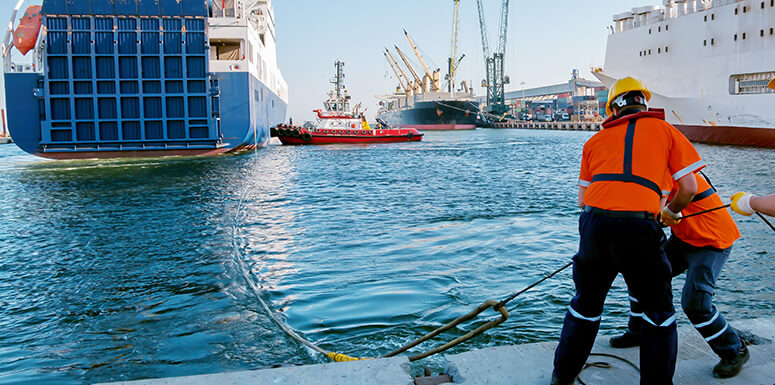
The Merchant Marine Act of 1920, also known as the Jones Act, states that if you are a seaman who has been injured on the job, you are entitled to the following benefits:
- Maintenance – Day-to-day living expenses
- Cure – Medical treatment expenses
To receive maintenance and cure benefits, you do not need to prove that your employer’s negligence or recklessness caused your injuries. This may sound straightforward, but getting the benefits you deserve is not always that easy.
If you are having problems getting the compensation you need after a serious injury while working in Houston’s Maritime industry, an experienced Houston maritime accident lawyer can help.
With a long history of fighting for injured maritime workers and record of getting results, call The Krist Law Firm, P.C. for a free, no-risk consultation: (281) 283-8500.
The Most Common Maintenance and Cure Benefit Questions
Below are some of the most common questions that we receive about maintenance and cure. But for further assistance with your claim, reach out today to learn what you may be entitled to.
1. What is Maintenance and Cure?
Maintenance and cure are no-fault benefits that injured seamen are entitled to under the Jones Act. These benefits include medical expenses and an allowance for day-to-day expenses.
In many cases, an injured sailor may pursue additional or alternate compensation under other laws such as the Outer Continental Shelf Lands Act or Longshore and Harbor Workers’ Compensation Act.
2. Do I Qualify for Maintenance and Cure?
To qualify for maintenance and cure benefits, you must meet the following criteria:
- You are employed on a vessel that operates on navigable waters
- The injury occurred while you were on board the ship or in the scope of your employment
3. What Does Maintenance and Cure Cover?
Maintenance benefits cover your daily living expenses. These maintenance payments should be sufficient to cover:
- Food
- Rent
- Necessary utilities like water, electricity, and gas
- Homeowners insurance
Cure benefits refer to the medical cost necessary to treat your injury. These expenses commonly include:
- Hospital and doctor bills
- Medication
- Medical tests
- Medical equipment such as crutches or a wheelchair
4. Can I Choose My Doctor Under Maintenance and Cure?
As an injured seaman, you have the right to choose your own doctor. If your employer requests that you submit to a medical exam with a doctor of their choosing, you have the right to obtain a second opinion from the physician of your choice.
5. What If My Employer Doesn’t Pay Maintenance and Cure?
It’s rare for an employer to refuse to pay out maintenance and cure benefits. In such cases, you have the right to bring legal action. In a lawsuit, you may be able to recover not only unpaid benefits but punitive damages that address the employer’s refusal to compensate you.
6. How Long Does Maintenance and Cure Last?
Your employer must pay maintenance and cure benefits until you have reached “maximum medical improvement,” known as MMI. Under the Jones Act and subsequent law concerning the act, MMI occurs once a physician has determined that your condition cannot be improved anymore and that there are no other possible treatment options for you.
Unfortunately, this means that if you’ve received a permanently debilitating injury, your maintenance and cure benefits may end earlier than would like them to. Even though you may still need medical treatment to maintain your health, you are no longer entitled to maintenance and cure benefits once your health can no longer be improved.
7. Do I Need a Lawyer for Maintenance and Cure?
If your claim is straightforward, it can probably be handled without an attorney. However, an experienced Houston Jones Act lawyer can strengthen your claim and move you through the process quicker. Other benefits of having a lawyer are:
- Negotiating a higher maintenance payment
- Ensuring that more of your medical expenses get considered as cure benefits
- Expediting the compensation process
- Taking legal action if your employer attempts to underpay or delay your benefits
Let an Attorney Review Your Case
If you suspect that your injuries resulted from any wrongdoing on your employer’s part, you should consult an attorney at The Krist Law Firm, P.C. right away. If your employer was negligent or reckless, you may be entitled to additional compensation, such as vocational retraining expenses, long term medical care, and more. It is very important for you to seek such compensation, especially if you will require continued medical treatment or therapy once you’ve passed the point of MMI.
The Krist Law Firm, P.C. Can Help
Your employer may have been negligent if they failed to evacuate you from the ship or provide you with emergency medical treatment when you got injured. Alternatively, the ship owners or officers may have allowed the seaworthiness of the vessel to deteriorate, or could have made a decision that put your and other seamen at risk.
These cases require decisive action from industry professionals. With decades of experience and a track record of holding negligent maritime companies accountable, The Krist Law Firm, P.C., knows how to help sailors and their families get the compensation they deserve.
Call us today at (281) 283-8500 or contact us online for your free consultation.

